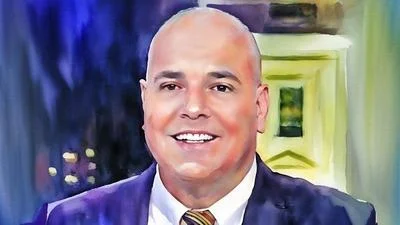Washington and Hollywood are still recalibrating after years of deep engagement with China that reshaped markets and free speech. Author Chris Fenton argues the United States must “rebalance the relationship” and put American principles ahead of profits.
Fenton grew up in South Florida and later moved to Glastonbury, Connecticut. He graduated from Cornell University with an engineering degree, hitchhiked across the country, and landed in Los Angeles in 1994. He broke into the William Morris Agency mailroom, became an agent for filmmakers and financiers, and then pivoted to producing and cross-border deals that drew him into China around 1999–2000.
He describes a Hollywood boom before his China turn. “I arrived in L.A. when the economy looked rough, but entertainment was booming,” he says. “DVD and home video brought in a lot of extra revenue.” He recalls the calculation that followed the dot-com crash. “Technology money left, German and Japanese financing dried up, and I looked to China as a place to help finance movies.”
Early signals from Beijing suggested limits. “The market was weak, theaters were part-time, and the Ministry of Propaganda strictly curated maybe 15 to 20 imports,” he says. “People involved with films like Red Corner, Kundun, and Seven Years in Tibet landed on a blacklist.” He frames the strategy that emerged. “We started asking what would happen if we created content Beijing wanted the rest of the world to see, not just content that avoided bans.”
He offers Looper as an example. “In the script, the character retired to France,” Fenton says. “We convinced the filmmakers to make it China. We invested, we helped, and it tested as one of the best moments with U.S. audiences when Jeff Daniels said, ‘I’m from the future. You want to move to China.’ Beijing loved it, and we thought we had a formula that worked.”
His book Feeding the Dragon tells the longer arc. “I wrote a timeless story that ran roughly from 1999 to 2014,” he says. “People like me believed since 1971 that opening China grew U.S. GDP and spread democratic aspirations. We felt a higher purpose, so we justified short-term compromises to reach a positive outcome.” The reckoning, he says, arrived later. “You didn’t notice a slow-moving train wreck in real time. You needed a punch-in-the-nose moment.”
That moment came during the NBA’s Hong Kong controversy. “Daryl Morey tweeted ‘Fight for freedom. Stand with Hong Kong,’ and I said, ‘That is going to destroy the NBA in China,’” Fenton says. “All hell broke loose, and the response fumbled. I realized I had helped promote the very dynamic that now blew up.”
He now calls for a reset that puts country over cash. “We still have influential people who looked the other way and kept reckless capitalism going,” he says. “We put patriotism behind capitalism, and the foundation of capitalism crumbled when we didn’t protect American ideals first.” He points to inconsistent treatment of adversaries. “Would we have allowed a North Korean TikTok in the U.S.? No,” he says. “We undermined hard-line trade negotiations with side meetings, and money muddied judgment in Washington.”
Free speech pressures, he says, complicated debate. “My book came out and I couldn’t get on certain outlets because I appeared on others,” Fenton says. “I talked about Beijing’s policies, not the Chinese people. Silencing constructive criticism kept us from fixing a broken relationship.”
Hollywood’s commercial dependence on China, in his view, has already faded. “The China market doesn’t mean anything to Hollywood again,” he says. “We mentored their industry, and their domestic films filled theaters and felt more relevant to their audiences.” He sees limited room for stories that name Beijing directly. “Maybe a James Bond villain or a Bourne-style plot,” he says. “For most movies, economics drive choices more than censorship.”
Propaganda effects persist, according to him. “Ask my kids what they picture when they think of China,” he says. “They see blue skies, gleaming infrastructure, high-tech cities, because Hollywood only showed that. Ask about Moscow and you never saw blue skies. That was powerful, and thirty years from now people will still carry those images.”









